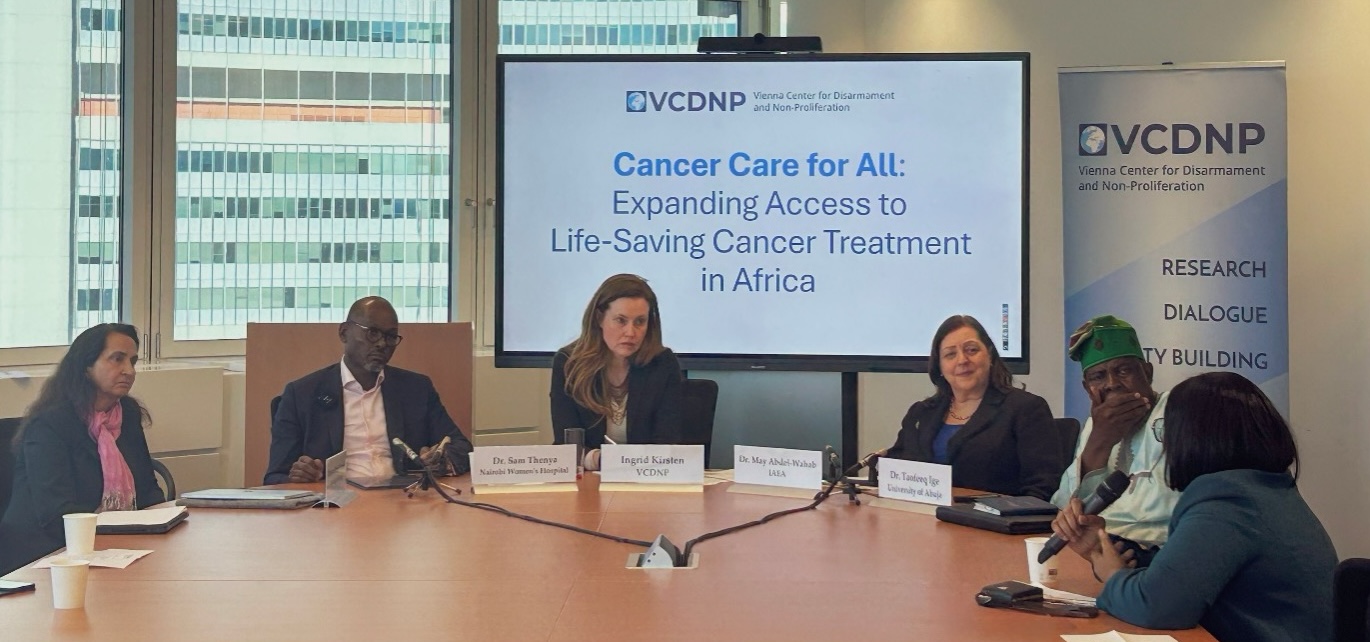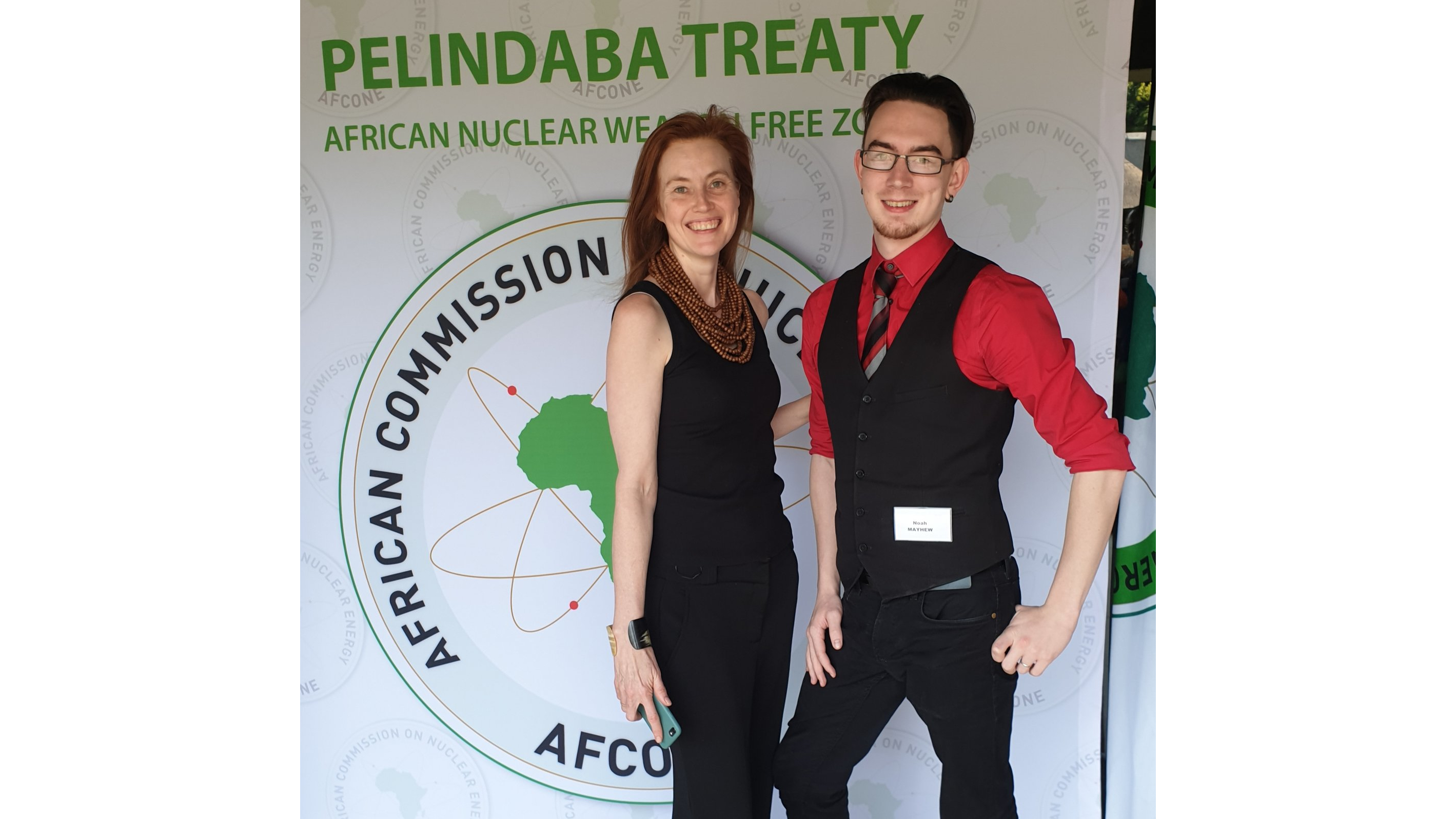
There is a staggering shortage of radiotherapy machines in middle-and low-income countries (LMICs). In sub-Saharan Africa more than 20 countries have no access to radiotherapy which is critical to combating cancer. Only 10 percent of patients in low-income countries, and 50 to 60 percent in middle- income countries, have access to radiotherapy compared to 90 percent in high-income countries. Cervical cancer kills nearly 300,000 women every year in LMICs even though it is largely preventable and curable in high-income countries, where it can be detected early and managed effectively. Nineteen of the twenty countries recorded as having the highest cervical cancer burden in the world, are in sub-Saharan Africa.
The VCDNP’s new case study on advancing access to radiotherapy in LMICs examines some of the reasons behind this equity gap. It also makes recommendations to address these challenges drawing on lessons learned from Zambia’s (a low income country) approach to ensuring and advancing access to radiotherapy, and from discussions with experts and policy makers across the globe.
The case study also drew on a VCDNP panel discussion and fact sheet on ensuring access to nuclear technology for human health, and on a workshop on improving access to radiotherapy LMICs held on the occasion of World Cancer Day, 4 February 2022.
The workshop panel included Dr. Alfredo Polo, Radiation Oncologist at the IAEA Division of Human Health, Dr Joel Yarney, Head of the National Radiotherapy Oncology and Nuclear Medicine Centre at Korle Bu Teaching Hospital in Ghana, Ms Hester Burger, Medical Affairs Project Manager at Varian South Africa, and Ms Nina Wendling, CEO of the International Cancer Experts Corps. The panel was attended by medical experts, policymakers, and researchers from more than thirty countries.
Dr. Polo highlighted the importance of radiotherapy in cancer and care and noted that the proof of access is in the use of the service, not simply the presence of a facility. To this end other considerations such as availability of treatment, affordability and sustainability have to be considered when addressing global inequity in access to radiotherapy. The IAEA has provided support to its Member States over the past four decades to address many of these factors. It has supported more than 100 LMICs in gaining access to radiotherapy for cancer diagnosis and treatment. Through its Technical Cooperation Programme, its Division of Human Health in the Department of Nuclear Sciences and Applications, and its Department of Nuclear Safety and Security, the IAEA provides assistance to its Member States to establish safe, secure and effective national cancer care programmes, to enhance their diagnostic radiology, radiotherapy and nuclear medicine capacity, and to increase the provision of cancer treatment and higher quality diagnosis and care to patients. The IAEA also support countries in the cradle to grave management of the cobalt-60 sources used in source based radiation. Dr. Polo highlighted the IAEA’s new initiative “Rays of Hope”, which focuses on LMICs, prioritising a limited number of high-impact, cost-effective and sustainable interventions in line with national needs and commitments. You can find more information here.
In his presentation, Dr. Yarney spoke about the challenges related to providing radiotherapy to cancer patients in Ghana. He noted that the challenge was not only one of the need to increase access to radiotherapy but of addressing financial, logistical and psychological barriers to cancer diagnosis and treatment. Dr. Yarney highlighted the benefits and challenges related to the radiotherapy machines used for treating cancer namely the Linear Accelerator (LINAC) (electricity generated radiation) and the Cobalt-60 Teletherapy units. Ghana uses both. He noted that machines should be easy to repair and should be able to operate at full capacity in LMICs. He emphasised the crucial support provided by the IAEA to governments in establishing radiation therapy centers, pointing out that this support also extended to the development of an adequate workforce and to providing nuclear safety and security related guidance and support. Mr. Yarney illustrated how the utilisation of radiotherapy treatment was reduced by the long distances cancer patients had to travel in Ghana to reach the existing radiotherapy centers. Improving the distribution of radiation therapy centers throughout the country was key to improving access to and utilisation of cancer treatment. Read more here.
Ms. Burger addressed the role of education in transitioning to modern radiotherapy techniques. She noted that with LINACs, there is an increased need for accuracy in terms of dose and positioning to ensure effective cancer treatment. Training radiotherapy professionals to this end is crucial especially in Africa where Cobalt-60 has been largely replaced by LINACs in the last 10 years. The producers of LINACs – Varian and Elektra – provide training to support the use of LINACs in middle-income countries. Ms Burger provided an overview of Varian Education which formed a collaboration with two universities in South Africa, the University of Cape Town and Cape Peninsula University of Technology in 2014 to provide training for African radiotherapy professionals. The short course training programmes aim to focus on the practical skills required for qualified radiotherapy professionals. You can find more information here.
Ms. Wendling illustrated the existing disparity in the access to radiation therapy, particularly LINACs in LMICs and high-income countries. In Africa 29 out of 54 countries have LINAC radiotherapy facilities, of which 12 have only one LINAC (and more than 20 countries have no access to radiotherapy at all). In the US there is one LINAC per 150 000 people. In Africa as a whole there are approximately 400 LINACs for more than 1 billion people. Ms. Wendling highlighted that along with discussing access to radiotherapy, it is essential to consider the development of a trained workforce. She stressed that increasing workforce capability and capacity, understanding technology gaps, leveraging partnerships, and developing global mentoring networks and twinning programmes, all contribute to increasing access to radiotherapy and decreasing the equity divide. Read more here.
Panelists discussed the pros and cons of LINACs and Cobalt-60 teletherapy in the LMIC context with a view to their suitability, affordability, and feasibility. The security benefits of LINACs were emphasised but it was also agreed that countries must take informed decisions which strike a balance between the technology and the training available, affordability, maintenance costs and robustness. The panel also emphasised that access should be understood as an essential element of comprehensive cancer care. Overall, the global cancer crisis is a growing one. The international community, together with partners like the IAEA, must take collective action to strengthen cancer care, and to increase worldwide access to radiotherapy.

